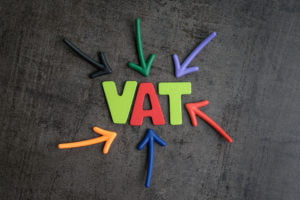What is Value Added Tax?
Value Added Tax was introduced to the UK in 1972 to replace Purchase tax and to conform to the European Common Market.
The Definition of VAT is a tax on the amount by which the value of an article has been increased at each stage of its production or distribution.
For most businesses in the UK, VAT is added at 20%. However some things are exempt from VAT , eg most food goods, children’s clothes, postage stamps, financial and property transactions, printed books, magazines and newspapers.
Some items are also charged at a reduced VAT rate of 5% e.g. energy and children’s car seats.
When you are starting a new business when should you register for VAT?

Important of VAT, tax in buy and sell business, colorful arrows pointing to the word VAT at the center on black cement wall, financial income have to pay government tax by law.
Reasons you should register immediately for VAT?
- Your new business is selling to other businesses. They will also be registered and will claim the VAT back as Input tax which reduces the amount they pay to HMRC.
- Your business is investing in capital items, which means that you can claim the VAT back and this will help your Cashflow. So if you bought a commercial vehicle for £24,000 you can claim back £4,000 on your next VAT return.
- If you are registered for VAT, other businesses will think you are larger than a one man band and have reached the VAT threshold of £85,000 turnover (Sales).
- Many small businesses do not prepare management accounts as often as they should to manage the business. Being forced to prepare the VAT return will mean that you actually have to look at the Sales and Purchases of the business which also means you look at the Profit and Loss and the Cashflow of the business. This can be a useful exercise when it comes to planning your future growth.
- With Corporation Tax, eventually to 17%, reducing below the VAT rate of 20%, it will be much more advantageous to claim back VAT for both Cashflow and profitability reasons.
Reasons you should not register for VAT?
- The business is primarily selling to consumers. That means they cannot reclaim the VAT. Not being registered gives you a 20% price advantage or a higher profit margin.
- If you have set up a part time or lifestyle business which does not have many VATable purchases and a turnover of less than £85,000 a year then Registering for VAT will just create more administration in addition to filing your tax returns.
The decision to Register for VAT or not is dependent on the particular business.
When I work with clients we look at the business plan and then decide on whether to register.
If you want advice on whether to register for VAT we can have a discussion so you can make the right decision for your business. Please contact Edward.tudor@hcbusinessadvisors.co.uk for more information.
